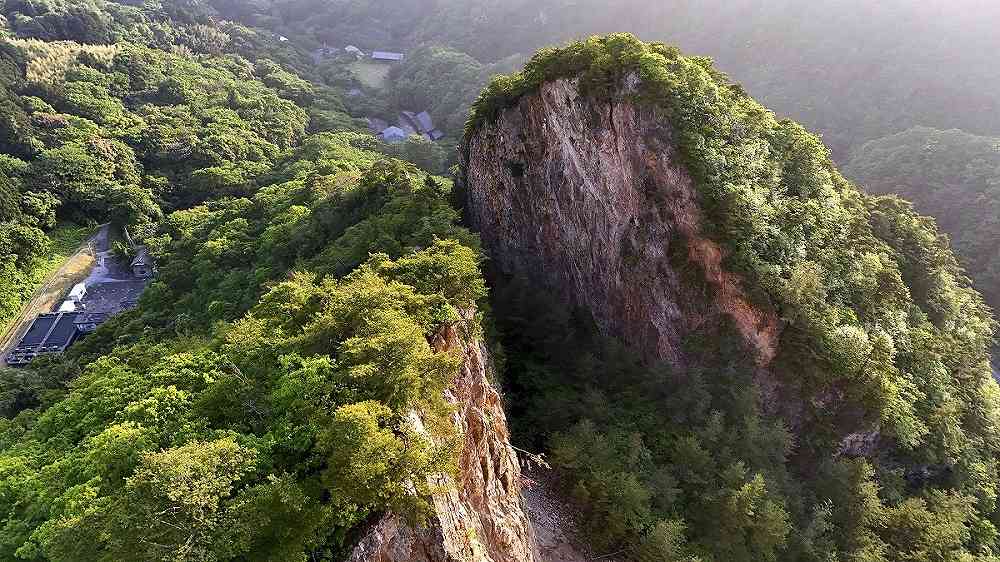Japan, South Korea Compromised Over Sado Gold Mines; New UNESCO Heritage Site Will Not Refer to ‘Forced Labor’

The Doyu-no-warito Opencut site, part of the Sado Island Gold Mines complex named to UNESCO’s World Heritage list
1:00 JST, July 29, 2024
The Japanese and South Korean governments each made concessions over the UNESCO World Heritage registration of a gold mining complex in Sado, Niigata Prefecture, agreeing not to use terms related to “forced labor” at an exhibition facility at the site but to include explanations about workers’ lives at the time.
UNESCO’s World Heritage Committee decided in New Delhi on Saturday to add the gold mines on Sado Island to its World Heritage list. Japan and South Korea reached their agreement apparently because officials wanted to avoid having another cause of conflict ahead of next year’s 60th anniversary of the normalization of diplomatic ties.
When the registration was decided at the meeting, Japanese delegates looked relieved as representatives of other countries offered to shake hands with them one after another. The South Korean delegation did not join the circle, but ambassadors of the two countries’ permanent delegations to UNESCO later shook hands at the venue.
South Korea had initially opposed the mines’ registration, claiming that the complex was the site of forced labor involving people from the Korean Peninsula during World War II. It sought a response from Japan on the matter.
During closed-door negotiations, Japan proposed installing a permanent exhibition at an on-site facility describing the existence of about 1,500 workers from the Korean Peninsula and the harsh working conditions at the time. The South Korean government ultimately accepted the plan, according to sources.
“The registration came after 14 years of effort. I’d like to share the joy with the people of our country,” Prime Minister Fumio Kishida on Saturday posted a message on X, previously Twitter.
Kishida also telephoned Niigata Gov. Hideyo Hanazumi and Sado Mayor Ryugo Watanabe. The prime minister reportedly told them that the central government will support local efforts to protect the Sado gold mines, which have shifted from being a Japanese treasure to one belonging to the world, and pass them on to future generations.
South Korea’s foreign ministry issued a comment on Saturday, saying the country expects Japan to take faithful measures and continue efforts to improve ties between Tokyo and Seoul.
However, leftist media and others in South Korea are opposed to the decision not to use the term “forced labor.” The leftist Hankyoreh newspaper said the decision cannot avoid drawing criticism.
Unique techniques
Mining for ore and the production of koban coins were carried out manually at the gold mines on Sado Island, under the control of the Tokugawa shogunate until the mid-19th century. Technology and knowledge from outside the country were restricted under the isolation policy of the day, leading to the development of unique techniques.
At its meeting on Saturday, the World Heritage Committee described the site as an extraordinary example of the continued use of manual mining and smelting technology when mechanization was progressively being introduced elsewhere.
The Sado Island Gold Mines consist of the Nishimikawa Placer Gold Mine and the Aikawa-Tsurushi Gold and Silver Mine.
At the Nishimikawa gold mine, gold dust was collected with a method called onagashi. After gold dust was excavated by hand from a mountain, excess stones and dirt were washed away with a large amount of water stored in an embankment.
At the Aikawa-Tsurushi Gold and Silver Mine, techniques were developed for digging tunnels by making full use of advanced surveying techniques and devising ways to drain water and ventilate the mine.
Workers dug for veins of ore at the Doyu-no-warito Opencut site, which measures 30 meters wide and 74 meters deep. This site illustrates how the mines were excavated at the time.
Top Articles in Society
-

Producer Behind Pop Group XG Arrested for Cocaine Possession
-

Man Infected with Measles Reportedly Dined at Restaurant in Tokyo Station
-

Man Infected with Measles May Have Come in Contact with Many People in Tokyo, Went to Store, Restaurant Around When Symptoms Emerged
-

Woman with Measles Visited Hospital in Tokyo Multiple Times Before Being Diagnosed with Disease
-

Australian Woman Dies After Mishap on Ski Lift in Nagano Prefecture
JN ACCESS RANKING
-

Producer Behind Pop Group XG Arrested for Cocaine Possession
-

Japan PM Takaichi’s Cabinet Resigns en Masse
-

Man Infected with Measles Reportedly Dined at Restaurant in Tokyo Station
-

Israeli Ambassador to Japan Speaks about Japan’s Role in the Reconstruction of Gaza
-

Videos Plagiarized, Reposted with False Subtitles Claiming ‘Ryukyu Belongs to China’; Anti-China False Information Also Posted in Japan
























